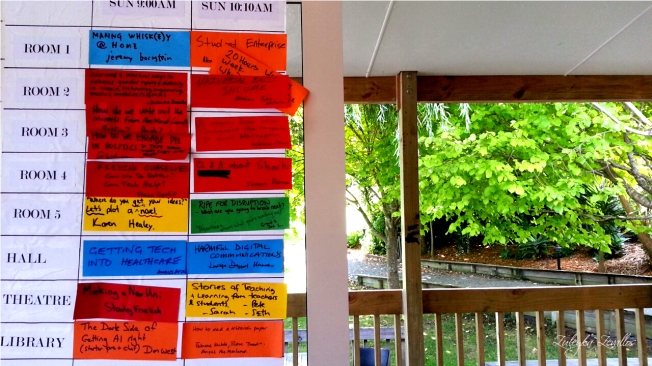
In March, I travelled to Auckland New Zealand for Kiwi Foo, a two-and-a-half day “unconference” where 150 participants from New Zealand and other parts of the world from a wide range of professional backgrounds self-organise the sessions. This includes people from technology companies, policy and community organisations, as well as academics . The idea behind Foo Camp is to bring together like-minded individuals who might otherwise not meet, and listen to one another and look for ways to connect in our common goal to make the world a better place.
In order to attend, one must be nominated by a previous Foo alumn from Kiwi camp or SciFoo from the UK. You pay for your own travel but all other costs, including food and lodging if you want it, are provided. When you accept the invitation, you nominate three keywords. Upon arrival, in a large hall filled with around three hundred people, each person stands up to introduce themselves by their name, their affiliation and their keywords, without elaboration. It took awhile but it was fun. My three keywords were: gender equity & diversity; science communication; sociology.
The Unconference Challenge
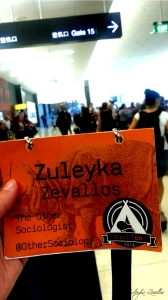
I initially felt uncomfortable about the idea of an unconference, a conference that is organised by participants:
“Unlike traditional conferences, an unconference is a participant-oriented meeting where the attendees decide on the agenda, discussion topics, workshops, and, often, even the time and venues. The informal and flexible program allows participants to suggest topics of their own interest and choose sessions accordingly. The format provides an excellent opportunity for researchers from diverse disciplines to work collaboratively on topics of common interest. The overarching goal for most unconferences is to prioritize conversation over presentation. In other words, the content for a session does not come from a select number of individuals at the front of the room, but is generated by all the attendees within the room, and, as such, every participant has an important role.”
Kiwi Foo turned out to provide a highly supportive discursive space. I was heartened that the Kiwi Foo website has an anti-harassment policy that is also emailed upon registration.
The unconference begins after the three-word introductions, where new Kiwi Foos are given first preference in putting up proposed talks and sessions. The main lounge area has several large posters up around the room with times and rooms available and you take the spot that best suits you. Most people do not propose talks but rather prefer to participate in discussions. If there are similar talks, the organisers will encourage the speakers to join together in the spirit of collaboration.

The talks were surprising in breadth of topic and sentiment. There were talks about new research and innovation; but there were also talks about how to redefine life after surviving cancer; some people nominated their own passion projects or their professional work; but others led discussions on how to enhance collaboration and not for profit work. Almost every talk was an interactive discussion or hands-on session, and few people used any PowerPoint.
Below you get a sense of the diversity of talks I’m going to tell you a little about some of the sessions I attended.
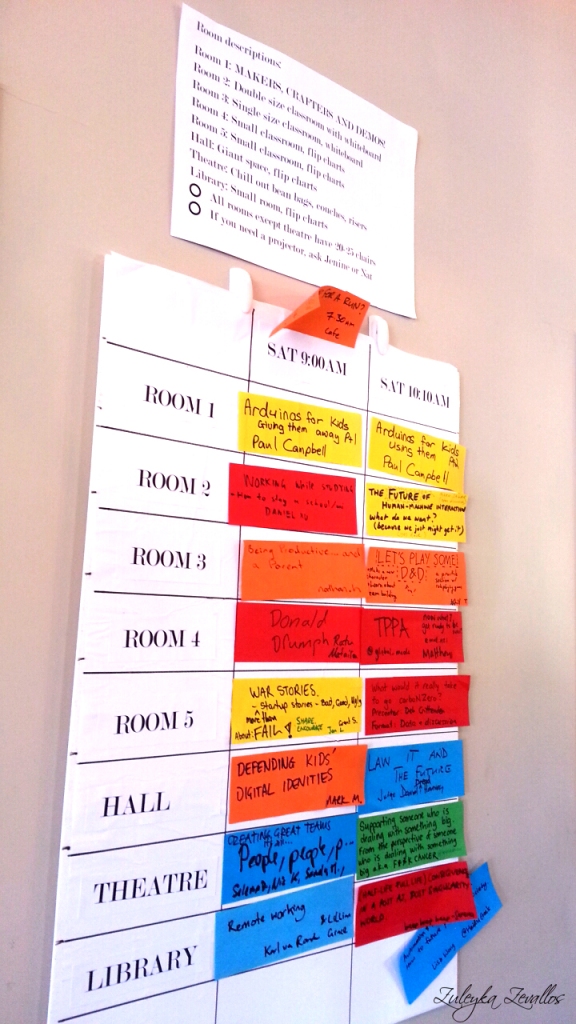
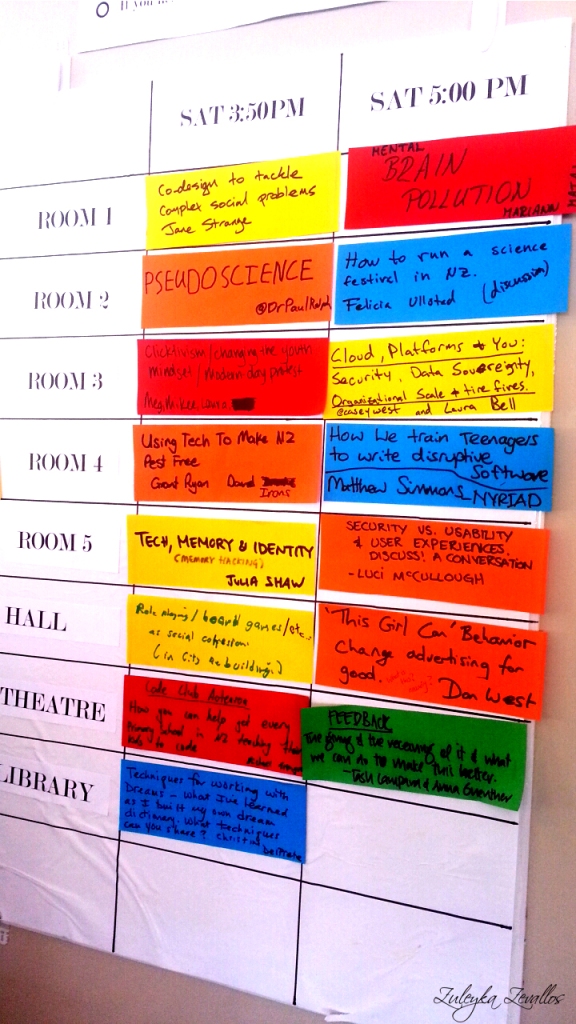
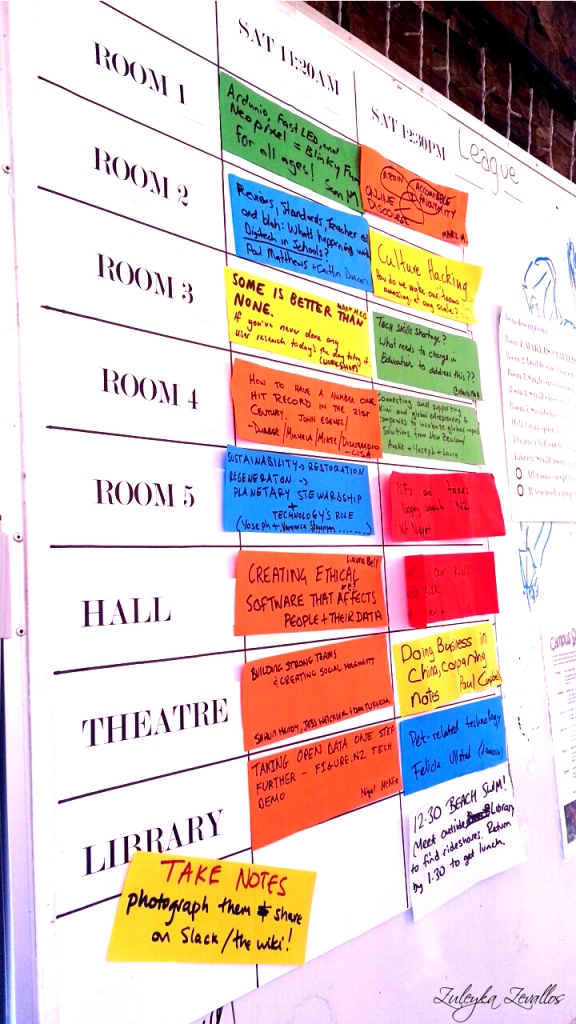
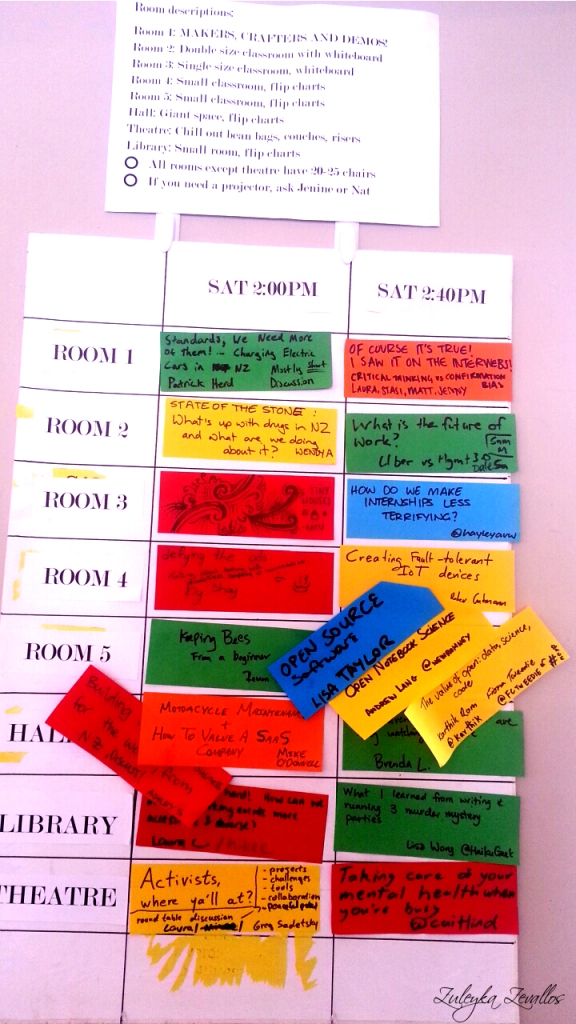
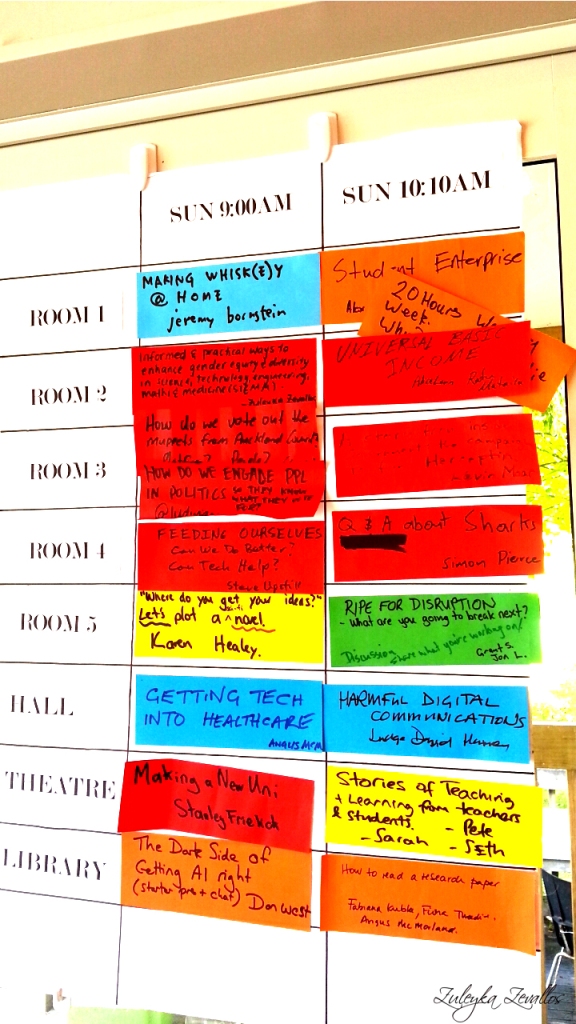
Law, I.T. and the future
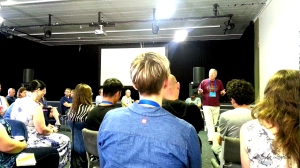
David Harvey, a former judge recently turned academic, talked about progressive online legislation. He is set to open a new academic centre on the topic and sought ideas and questions about the type of issues they might cover, as well as crowd-sourcing ideas for further funding. He talked about how slow the law has been to catch up on international patterns of internet use, and how online legal resources were arcane and difficult to navigate. I asked about how to bridge the digital divide given some socio-economic groups barely have access to reliable internet connections, including in Australia. Harvey said dedicated public spaces such as libraries and court houses should support access to online laws.
Taking people with you

Another session on building stronger teams when creating social movements was well attended by people from various backgrounds. Shaun Hendy and Jess Weichler led the session. We sat on pillows on the ground and shared our experiences running volunteer groups. Other audience members talked about methods to leverage corporate sponsorship, and the limits of different approaches, as well as online tools to help connect potential volunteers to particular causes through skills, not just their passions. One suggestion that appealed to many people, including me, was Wellington’s Time Bank, where volunteers are “paid” in time credits, which they can use to hire someone else to volunteer for your cause.

A few of us discussed the challenges in keeping volunteers engaged, by knowing why they sign up and by validating their service in tangible (if not material) ways.
I talked about how one of my common experiences co-managing several scicomm groups is that people who volunteer do so for different reasons, and expectations will vary. One thing that has helped the groups I volunteer with is to set rules and be explicit on what it means to be a volunteer, as well as publicly state our values. For example, in an earlier incarnation of Science on Google+, three women of color moderators would exclusively respond to sexist trolling in our online science community. It helps that, with clear guidelines and new volunteer moderators, we can explicitly say our group is run by feminists, and know that our male colleagues will uphold this.
I liked the suggestion by another participant who said that showing appreciation of volunteers goes a long way, with someone else suggesting that “experiences” are given as trade and “payment.” For example, friends will donate activities (such as indoor rock climbing) that a volunteer group can offer their members, in exchange for other forms of volunteering.
Networking is hard
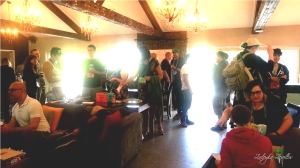
Laura Campbell, a lawyer in her everyday life, and Mikee Tucker, founder of record label Loop, led a lovely discussion on how to make networking more diverse and accessible. A colleague talked about how Kiwi Foo was great, but very difficult for an introverted scientist such as himself. He suggested that organisers might consider putting on more one-on-one activities every evening. Games and structured conversation scenarios are more ideal for introverts.
Co-design to tackle complex social problems
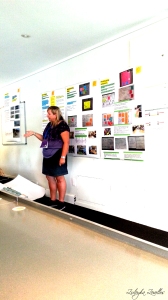
Jane Strange talked about using co-design to tackle social policy problems. This involves not simply gathering data from community groups affected by particular issues, but also supporting community members to lead solutions. Using a set of posters, Strange discussed how two government agencies partnered with an NGO to better engage youth in South Auckland to increase the rates of youth-of-driving-age getting their licence. This area has a low-socioeconomic profile with high rates of youth crime and incarceration, however, many offences begin with minor issues, such as driving without a license. Getting a licence requires a relatively sound level of literacy and additional costs to qualify, and in rural areas where many families are struggling on social welfare, such things are luxuries.
Strange talked about driving licenses as a social justice issue. Eighty percent of youth cannot afford to pay driving-without-a-license fees of around $200. They are duped by the system into accepting community service, convinced by unscrupulous advisers that this is a good way to get work experience; however, this is a gateway into the criminal system. After another offence of driving-without-a-license, youth are less likely to get community service and instead are sent to jail, which exposes them to other criminal activities.
Not having a licence is also an economic justice issue: 70% of jobs in this area require a license. Strange talked about one young person who was qualified as a nurse but had to wait to be able to afford to go for their full licence, which meant working at a burger place for two years, while her qualifications went to waste.
Where driving-without-a-license is the norm, there are family consequences. One youth Strange worked with had been fined and subsequently lost his car. Now he continues to drive his mother’s car unlicensed, which jeopardises his mother’s car being impounded.
In this context, it became clear that the legal framework was failing youth and their communities.
Strange’s program connected youth with agencies, service providers and other community workers so they could together find priority areas during an initial workshop. Beyond traditional community consultation, youth would test their own recommendations by going back to their own communities and testing their proposals. Youth and community members were involved in evaluating and improving the new set of guidelines and public information campaign ideas. At the implementation phase, multiple ministers and a range of government agencies were linked together to find ways to keep the program running long term.
Strange noted that to collaborate in co-design policy, government agencies had to be willing to lose control. While this proves very challenging for policy-makers, the program so far suggests the results are far better than perpetuating the senseless imprisonment of disadvantaged young people.
This Girl Can
Digital strategist, Dan West, discussed the impact of “behavioural economics” in tapping into gender equity themed advertisements. West noted that the UK ranks at around 7th place in the world amongst men who exercise, however it is in 17th place in terms of women who exercise. In comparison, Sweden ranks in 4th place for women. Market research shows that women in Britain refrain from exercise for a mix of reasons:
- Worried about looks when exercising
- Concerned about letting their team down
- Mothers sacrifice the time they would otherwise spend at the gym to spend more time with their children.
For their advertising campaign for This Girl Can UK, West’s team focused on fear of judgement. The campaign was mostly well received on social media, evidenced in encouraging tweets; however, there was some backlash. The advertisement was made by “mostly women” (though West did not elaborate further) and yet the public perceived that the opposite must be true. Some women perceived that the use of the word “girl” infantalised women. At the same time, West reports that the advertisement had success in increasing the number of women who exercised over a 1.5 year period.
https://www.youtube.com/watch?v=toH4GcPQXpc
During questions from the floor, West addressed the misuse of behaviour economics and brand identity, such as Cadbury chocolates sponsoring an exercise campaign. In another case, Dove’s “feeling hot” campaign focused on women’s hairless underarms.
What I especially enjoyed about this walk was West’s open-ended reflection on the social justice “foot print” of advertising. He mused: what is the accountability for his field? He used the example of Benson & Hedges, a cigarette company now being held accountable for contributing to decades of poor health, spurred by heavy-handed and misleading advertising. West notes, however, that while the smoking giant has faced public scrutiny, the advertising agencies who worked with them have not.
Ethics and social justice in advertising – a fruitful dialogue that I’d like to pick up again some day.
So long and thanks for all the Foo
Lessons from Kiwi Foo:

- Find ways to make introverted people feel welcome: include one-on-one opportunities for networking
- Consider intersectionality: host diverse speakers from a range of ethnic, racial and gender backgrounds (including transgender speakers). One of the Kiwi Foo keynote speakers was Potaua Biasiny-Tule, a Maori entrepreneur who talked about his internet business in a way that told the story of his community.
- Make feminism visible: include a statement against harassment in rules of conduct
- Cross-disciplinary dialogue matters: bring together individuals from different sectors.
Notes
In accordance to Foo rules, I asked all participants photographed for permission to take pictures and write about their work on social media.


2 thoughts on “Sociology of Kiwi Foo, an Unconference”
Comments are closed.